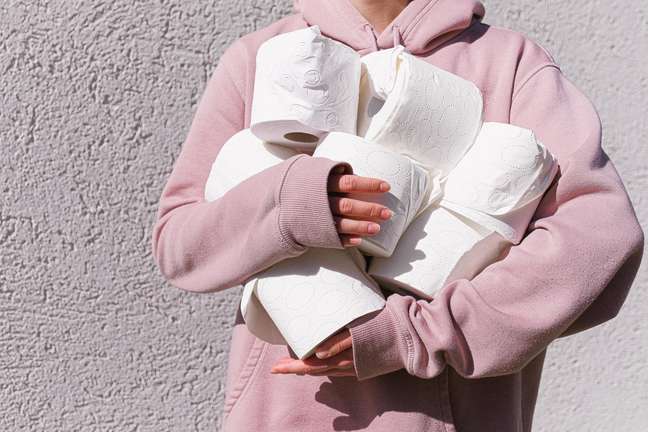Due to the typical hormonal changes around this time of the month, it is common for the intestines to become blocked in PMS and release when menstruation arrives.
If you are menstruating, you may have already noticed that not only cramps and mood swings suffer from a menstrual cycle: the period also interferes with the health of the intestines, and it is very common for us to suffer from the so-called menstrual diarrhea.

Yes, it’s true: it’s not uncommon for the intestine to “let go” on the first day of menstruation, as a response from the body to the discharge of hormones that also mark the beginning of the menstrual cycle itself. And this, of course, has an explanation:
“The most common thing is that between ovulation and menstruation, the intestine becomes more trapped (because progesterone predominates in this phase – an effect similar to pregnancy), and, during the menstrual period, due to the action of mediators inflammation, softening or even diarrhea occurs,” says the Dr. Igor Padovesi gynecologist and obstetrician at the Albert Einstein Hospital.
Menstruation is an inflammatory phenomenon, which involves the production and release of inflammatory substances called prostaglandins. For some women, the increase of these substances in the blood can make the intestines loose – this is menstrual diarrhea.
Incidentally, since it is a natural response of every woman’s body, it is practically impossible to prevent this intestinal alteration from occurring. However, the use of continuous, uninterrupted hormonal contraceptive methods that stop menstruation can prevent this change from occurring.
MENSTRUAL DIARRHEA VS COMMON DIARRHEA
Whether it’s due to inattention to the cycle itself, or for any other reason, an episode of menstrual diarrhea can be frightening or worrying. Therefore, it is important to keep in mind the differences between temporary diarrhea and a more severe one.
“Menstrual diarrhea is usually not intense (it may just be a softening of the stool), nor does it contain blood or mucus, nor does it cause fever or abdominal pain. These are warning signs for another condition,” the doctor explains.
INTESTINY TRAPPED DURING MENSTRUATION: WHAT TO DO?
Well, you can already tell that intestinal changes will happen in the menstrual period. The question is how to deal with them. In the case of constipation (which usually happens in the premenstrual period), the condition can last for the reasons listed above, so it’s worth figuring out how to reverse it:
“Improving the diet (rich in fiber and lactobacilli), exercising, increasing hydration: these are basic measures to improve intestinal habits”, continues the doctor. “It is also possible to use medications such as probiotics and herbal medicines before using laxatives.”
BOWL LOOSE DURING MENSTRUATION: WHAT TO DO?
On the other hand, if your bowels leak during your period and continue to leak, it is very important to see a doctor to have the condition investigated. Agree with the doctor. Igor, it’s entirely possible that this diarrhea is caused by another condition – the most common being viruses and food poisoning, which tend to be self-limiting.
🇧🇷The best content in your email for free. Choose your favorite Terra newsletter. Click here!
Source: Terra
Ben Stock is a lifestyle journalist and author at Gossipify. He writes about topics such as health, wellness, travel, food and home decor. He provides practical advice and inspiration to improve well-being, keeps readers up to date with latest lifestyle news and trends, known for his engaging writing style, in-depth analysis and unique perspectives.





![[Coluna] Does Brazilian protectionism inspire Trump? [Coluna] Does Brazilian protectionism inspire Trump?](https://p2.trrsf.com/image/fget/cf/774/0/images.terra.com/2025/10/16/2008907400-74231636354.jpg)

